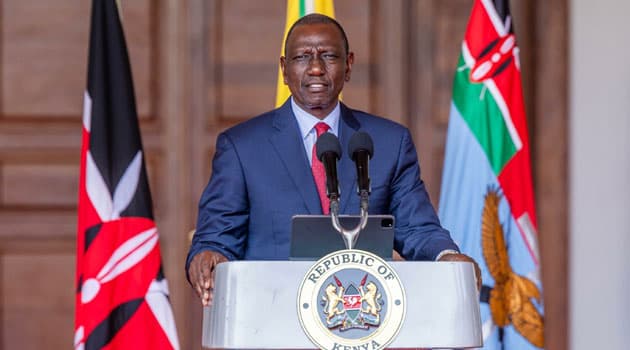We're loading the full news article for you. This includes the article content, images, author information, and related articles.
Deputy Chief of Staff Eliud Owalo says President Ruto has ordered the dismissal and prosecution of officials who channel government projects to their own companies, underscoring a broader push for digital procurement and anti-corruption reforms.

Nairobi, Kenya — 2025-09-11 13:00 EAT. President William Ruto and Head of Public Service Felix Koskei have launched a crackdown on civil servants awarding government contracts to companies they privately own, Deputy Chief of Staff Eliud Owalo said. Officials found in conflict-of-interest deals risk dismissal and prosecution.
What happened now: During an interview on September 11, Eliud Owalo confirmed that the President has directed the dismissal and prosecution of any government official found diverting public contracts to their private firms. Collusion between officials and contractors remains a key cause of project delays and cost overruns.
Why it matters: The move is presented as part of an effort to strengthen procurement integrity and align with the government’s broader agenda of transparency, especially with the rollout of e-procurement systems.
Status: Confirmed. Government is implementing new oversight; legal and disciplinary actions expected.
Kenya has in previous years suffered delays and inflated costs in public projects due to opaque procurement practices and conflicts of interest.
The Public Procurement and Asset Disposal Act is meant to prohibit awarding contracts based on political connections or private interest.
The government has been pushing e-procurement reforms to digitize contract awards and reduce corruption by increasing traceability and reducing human intervention.
Relevant Laws: Public Procurement and Asset Disposal Act governs how contracts are awarded; conflict of interest provisions apply.
Jurisdiction & Mandates:
➤ Office of the President (Delivery & Government Efficiency) overseeing enforcement.
➤ Investigative agencies (e.g., Directorate of Criminal Investigations, Ethics & Anti-Corruption Commission) to pursue legal cases.
What should happen next per law:
• Identify and investigate officials linked to private companies benefiting from contracts.
• Enforce dismissals or suspensions pending investigations.
• Prosecute where evidence supports criminal liability.
• Fully implement and enforce e-government procurement (e-GP) systems.
Eliud Owalo, Deputy Chief of Staff: “If anybody in government is found to be involved in unlawfully accessing public funds courtesy of the positions they hold, they will be asked to step down, and subsequently they will face the full force of the law.”
Tourism / Contractors & Civil Servants: Some have warned that enforcement must be consistent and not selective. There is concern among contractors about fairness of procurement processes.
Civil Society / Public Watchdogs: Emphasise that dismissals are not sufficient; need for transparent prosecutions and follow-through to restore public trust. (Views drawn from prior similar statements; see related reports.)
|
Detail |
Information |
|---|---|
|
Directive given |
September 11, 2025 by Deputy Chief of Staff Eliud Owalo, under instruction of President Ruto & Head of Public Service Felix Koskei |
|
Target practices |
Officials awarding contracts to their own companies; collusion between contractors & government staff causing delays/cost overruns |
|
Reform tool |
e-procurement / digital procurement being rolled out; resistance from some who prefer old systems |
Governance: If enforcement is inconsistent or politically motivated, could weaken trust in reform efforts.
Operational costs: Investigations and dismissals may slow down ongoing projects, especially where contracts are entrenched.
Legal risk: Officials may challenge dismissals or prosecutions in courts, raising issues with proof of conflict of interest.
Identity of officials under investigation or those already dismissed.
The scale (number and value) of projects already found to be affected by conflict-of-interest.
Detailed timelines for prosecutions or legal processes.
How contractor-civil servant relationships will be monitored to prevent future abuse.
July 2025: Owalo previously issued warnings about contractors using political connections and called for procurement transparency.
August 31, 2025: President Ruto challenged critics of e-procurement, suggesting those resisting reforms should resign.
September 11, 2025: Public confirmation of crackdown directive on conflict-of-interest involving government officials.
Publication of names of officials under investigation or already dismissed.
Reports of disciplinary action or criminal charges.
Progress and usage statistics for the e-procurement system.
Parliament or oversight body reviews of procurement integrity and reforms.
Keep the conversation in one place—threads here stay linked to the story and in the forums.
Sign in to start a discussion
Start a conversation about this story and keep it linked here.
Other hot threads
E-sports and Gaming Community in Kenya
Active 9 months ago
The Role of Technology in Modern Agriculture (AgriTech)
Active 9 months ago
Popular Recreational Activities Across Counties
Active 9 months ago
Investing in Youth Sports Development Programs
Active 9 months ago